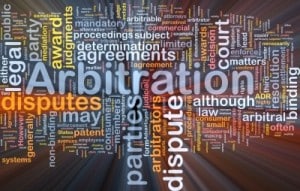
This was an extreme case, as the court was confident that any award issued by the arbitrator would be vacated on the ground of evident partiality because the arbitrator would be prone to issue a large monetary award that his corporation might purchase and resell and the parties should not be put to the delay and expense of trying such a case. The Ninth Circuit granted plaintiffs’ writ of mandamus and reversed. It noted that it had rejected court intervention in Aerojet General but had kept the door open for extreme cases “as an abundance of caution.” It found that this was not an extreme case because there was no assurance of a vacatur for evident partiality since the arbitrator’s ability to profit from a large award in favor of plaintiffs would be “attenuated” and “insubstantial” and it added that even if the arbitrator’s undisclosed activities created a reasonable impression of partiality, the court’s concern that delays and expenses would result if an award were vacated was “manifestly inadequate” to justify a mid-arbitration intervention.
Leave a Reply
You must be logged in to post a comment.